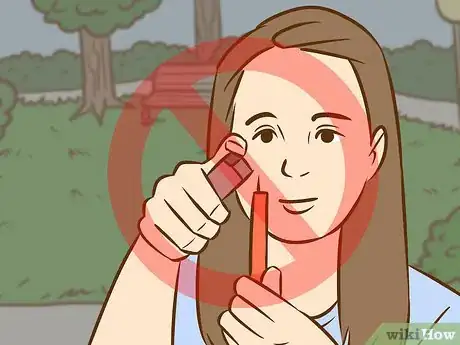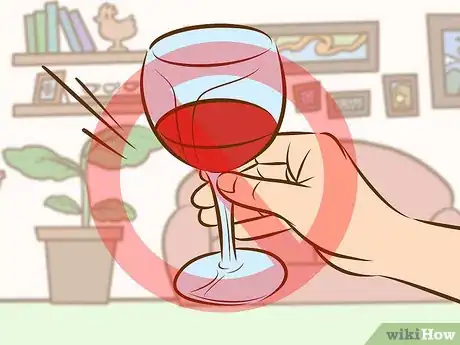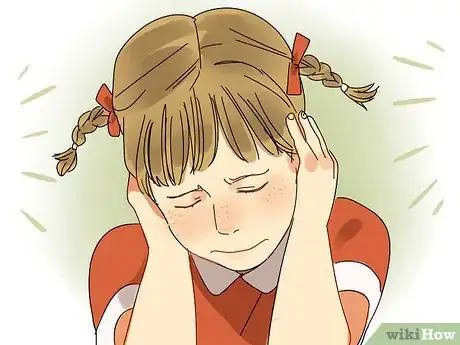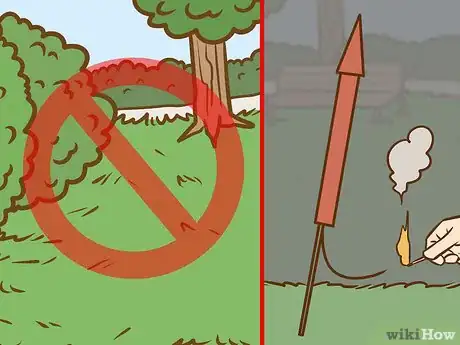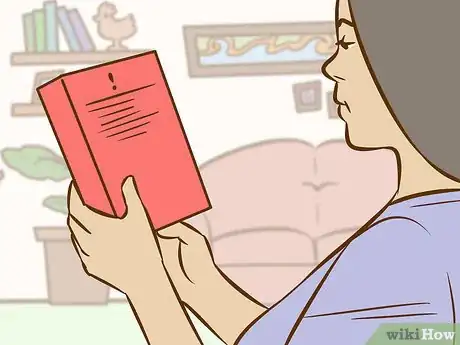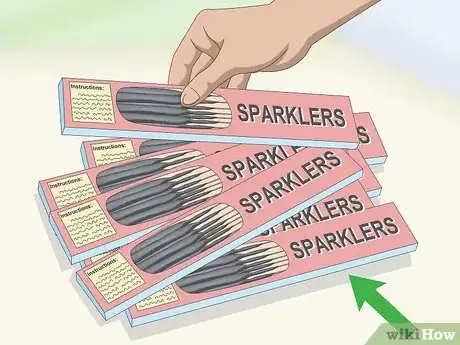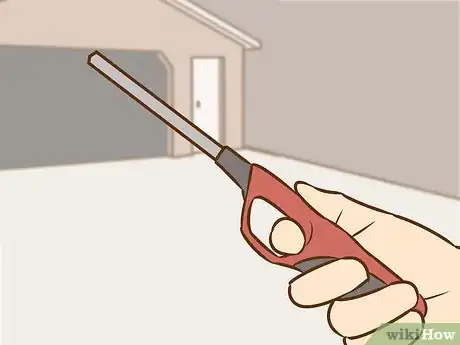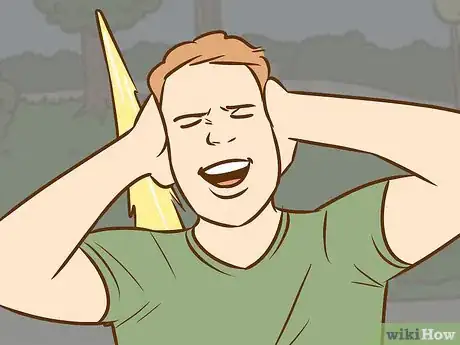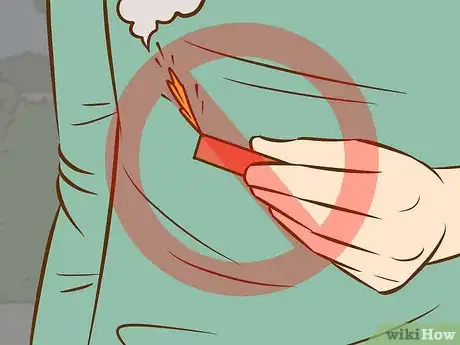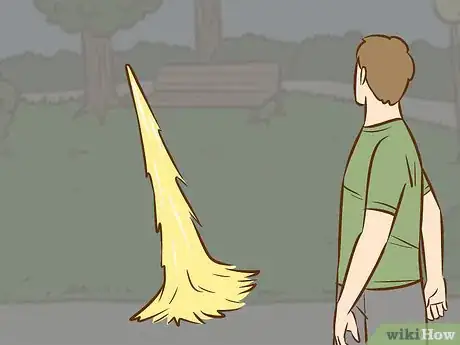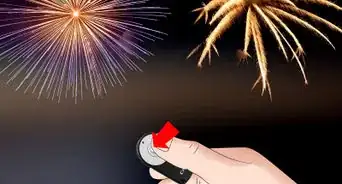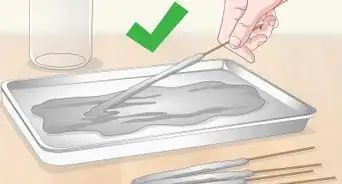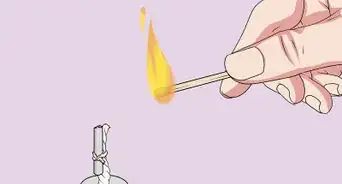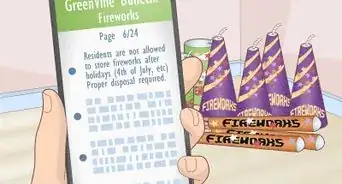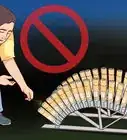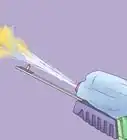This article was co-authored by wikiHow Staff. Our trained team of editors and researchers validate articles for accuracy and comprehensiveness. wikiHow's Content Management Team carefully monitors the work from our editorial staff to ensure that each article is backed by trusted research and meets our high quality standards.
There are 12 references cited in this article, which can be found at the bottom of the page.
This article has been viewed 88,275 times.
Learn more...
Fireworks have been a major part of many countries' holiday celebrations for centuries. And for just as long, people who set off and watch fireworks have suffered serious injuries or deaths because of poor safety practices. This is especially the case today, as consumer fireworks have become widely available. So it is essential that if you are planning to use fireworks, you go through a series of preparations to ensure proper safety, choose a launching site carefully, and use considerable caution when setting off the fireworks. Keeping in mind these simple steps can help to keep you and your spectators well protected during the fireworks display.
Steps
Taking Precautions Beforehand
-
1Protect your eyes and ears. Get a pair of safety glasses and earplugs for each person who will be setting off fireworks. These can be found at any hardware store and some drug stores. Improperly used fireworks frequently cause eye damage and hearing loss--nearly 40% of fireworks-related injuries occur to the head area.[1]
-
2Dress appropriately. Don’t wear loose clothing such as long skirts, jackets, or scarves, which can all catch fire easily. But do try to wear snuggly fitting long sleeves and pants to protect from potential burns.[2]Advertisement
-
3Use only legal fireworks. Only purchase fireworks with a Common Class C rating which means it's intended for the general public to use.[3] Shop only at public fireworks stands licensed to sell fireworks. These shops have expertise and know about the up to date laws and new developments in consumer fireworks so you can be sure you're getting legal fireworks. Legal fireworks will have a manufacturer’s label including safety instructions.[4] If you’re unsure whether a roadside fireworks dealer is selling legally, ask an employee to see their license to sell fireworks in the state.
- Illegal fireworks are typically named M-80s, M-100s, or quarter sticks. These are fireworks used as dynamites in mining or in battles by the military. They resemble a cardboard coin tube with a fuse in the middle, and are usually red, brown, or silver. The same also goes for military grenades,[5]
- Never buy fireworks from a friend, or someone placing a public advertisement. Even if the items appear professionally made, they could be illegal or in poor condition.
- If your area is experiencing severe drought, buying, selling, handling, using pyrotechnics during those conditions is illegal due to wildfire hazards.
-
4Store them out of reach. Until you’re ready to use them, keep your fireworks in a cool and dry place where children can’t get to them. Hot temperatures or damp air can damage the fireworks and make it more likely that they will malfunction.
- Try putting away your fireworks in a cardboard box, above or in a high cabinet, or on a top shelf.
- Avoid putting your stash of fireworks in direct sun, extreme heat, near electronics or heat sources.
-
5Never carry a firework in your pocket or enclosed in fabric or plastic wrap. A tiny spark of static electric charge can ignite a firework and it can cause injury or death. Fireworks are often wrapped in a special static proof plastic.
- Never handle a firework in your hand for extended periods. This includes the powder part of a sparkler. Heat from your body, static electric charges from clothes can set off the device as well.
-
6Have water on hand. Always have a supply of water nearby in case refuse, vegetation, or clothing catch fire. If you can’t find a safe area near a water hose, fill up several buckets of water and bring them with you to the site. To be extra safe, have a fire extinguisher nearby as well.
-
7Keep children away. Forbid young children to handle any kind of fireworks. Even sparklers are known to cause severe burns.[6] Ensure that children, and any other spectators, stand far back (at least 50 feet (15.2 m)) from the area where you’ll be lighting the fireworks.
- A 2005 study found that more than half of all fireworks injuries to children under 5 years of age were caused by sparklers.[7]
-
8Set off fireworks only when sober and alert. Being short of sleep, or under the influence of alcohol or other drugs can affect your judgment and coordination--two things you really need when setting off fireworks. The night before you plan to use fireworks, be sure to get as much sleep as you usually need to function properly. And before using fireworks, be sure to stay away from alcohol or any substances that tend to slow you down or make you feel tired.
-
9Use caution with pets. Loud noises can send animals into a panic, and they may run out of the house and be too disoriented to find their way home.[8] Keep your pet indoors or well secured with adequate hiding places if your pet is to be outdoors during the use of fireworks. Know your pet's reaction, as this can vary greatly among individual animals.
- There are tricks for calming dogs and cats.
-
10Check official regulations. Do an internet search to learn about what types of fireworks, if any, are legal in your state, province, or country. If you can’t buy a certain class of fireworks in your state or province, it is most likely illegal to use that class of fireworks in your state or province.
- Misuse of pyrotechnics by not following the safety instructions is in the United States is a felony crime which can lead to arrest and jail time.
- Many states in the U.S.A. consider any pyrotechnics that shoots in the air illegal. These regulations vary from region to region. Check with your local government authorities and websites.
Choosing an Appropriate Area
-
1Use fireworks outdoors only. Most fireworks produce fire and smoke, which can burn or set fire to many interior surfaces, and cause suffocation in small rooms. Even garage areas are unsafe since they typically hold containers of flammable liquids and motor vehicles, which can catch fire and explode if they come into contact with fireworks.
-
2Avoid setting off loud fireworks in residential or high-occupancy areas. Veterans, people with PTSD or anxiety issues, autistic people, babies, and other people's pets may be frightened by fireworks.[9] The last thing you want to do is cause a neighbor to have a panic attack or lose a beloved pet that ran away due to fear. If you are lighting fireworks in a residential area, choose very quiet ones, like sparklers.
- If you want to enjoy loud fireworks, go to a more remote area to set them off.
- Never light loud fireworks near a hospital. Premature babies are extremely stressed by loud noises, and their brains cannot handle a surge in blood pressure due to stress. In one case, two premature twins died after a loud night of fireworks.[10]
-
3Find an open area. A flat and wide-open area, with no overhead obstructions such as trees or buildings, will be best for setting off your fireworks. Try to choose an area as far away from residences as possible, to avoid bothering neighbors. And keep cars, gasoline tanks, and other containers of flammable liquids or materials far away from the area where you’ll be setting off fireworks.
-
4Watch for dry vegetation. Don’t set off fireworks in an area covered in dry grass, or overgrown with dry weeds. These can easily catch fire if they come into contact with fireworks. For the same reason, never set off fireworks in a forest, which often has dry leaves and dead wood on the ground.
- If there has been a drought in your region, check with your city government about possible restrictions or prohibitions for setting off fireworks.
Practicing Safety when Setting Off Fireworks
-
1Follow instructions on the package. All professionally made, legal fireworks should have igniting instructions on the packaging. Read these carefully, making sure each step is understandable. Take extra care to follow each step for less-typical fireworks such as tanks, boats, and pinwheels.
- If possible read the description of new items performance. Look up the item's name in a catalog in print or online. This way you'll at least know what to expect and make better judgments. Many new aerial repeaters now use panoramic/angle shoots that take more space to perform than other traditional ones. The same goes for anything that has aerial spinners or does stunts in the air.
- Also skyrockets or missiles can make unexpected changes in direction at any time, more often than aerial performers that mostly shoot straight up.
-
2Give even the small pyrotechnic devices respect. It's easy to overlook a small fountain or spinner. However, if misused, they can have serious consequences. The string/confetti poppers, crackers, guns often used during New Years Celebrations can cause fire or body injuries.
-
3Use longer lighting devices. Avoid using cigarette lighters or matches to light fireworks, since wicks sometimes emit sparks that can burn your hand if it is too close. Instead, light fireworks with a punk or an extended butane lighter that gives you at least 5 inches (12.7 cm) between your hand and the fuse. Light the fuse only at the very tip to prevent the piece from igniting too soon.[11]
- If you are igniting fireworks in the dark, use a headlamp, flashlight, or another non-flammable light source to help you see clearly what you’re lighting.
-
4Set up the fireworks correctly before igniting. Place mortars, fountains, repeaters, planes, tanks, and other novelty items on hard flat surfaces like asphalt and concrete, not grass, so it won't tip over. Stick skyrockets and Roman Candles firmly into the ground so they don't fall onto the ground after lighting or so the force of the explosion won't launch the device out of the ground.
-
5Keep your head away. When lighting aerial fireworks such as rockets, repeaters, and mortars, do not lean over the top of them when lighting the fuse. Fuses have been known to malfunction and ignite fireworks immediately, without any delay. If this happens and your head is near the path of the projectile, you could suffer serious injury.
- Never look into a mortar tube. Sometimes wicks burn unevenly and can ignite the shell after a longer-than-usual delay. Don’t approach the mortar or look into the tube for any reason after a shell fails to ignite.
-
6
-
7Light one at a time. Never ignite more than one shell, rocket, firecracker or other fireworks at a time.[14] They are designed to be lighted individually, and any attempt to light more than one at a time could cause them to malfunction.
- For example, do not try to twist or tie fuses together, or light one rocket or mortar shell just after lighting another.
-
8Do not hold lit fireworks in your hand. Don't attempt to launch bottle rockets from your hand, or light and throw firecrackers. Always light any fireworks from a flat surface, or in the case of rockets, a pipe or bottle.[15]
-
9Stand back after lighting. Most fireworks’ fuses should be long enough to allow you to get at least 20 feet (6.1 m) away from the launch area. Staying any closer increases your risk of getting injured when the fireworks go off. Be sure to clear the area of obstructions, such as tree branches or rocks, that you could trip over when walking or running back from the launch area.
-
10Keep spectators away and upwind. Ask anyone who will be watching your fireworks display to stand at least 50 feet (15.2 m) away. And pay attention to the wind direction. Sparks from live fireworks, or spent but still-burning rockets can be blown into spectators by winds. Be sure to position spectators where the wind will be blowing in the direction they’re facing.
- For example, if the winds are blowing to the north of the launch area, position the spectators to the south of the launch area.
- Don't light fireworks during strong winds. If it’s too windy to ignite your lighter, it’s probably too windy to set off fireworks safely.
Community Q&A
-
QuestionAre firework sticks safe?
 Community AnswerLike all flammable things, such as matches and lighters, firework sticks can be dangerous if misused.
Community AnswerLike all flammable things, such as matches and lighters, firework sticks can be dangerous if misused.
Warnings
- It is a violation of federal law to carry fireworks onto an airplane.⧼thumbs_response⧽
- Do not allow anyone to smoke around fireworks.⧼thumbs_response⧽
- Never aim lit projectile fireworks, such as rockets, roman candles, or mortars, at other people.⧼thumbs_response⧽
- Do not make or use homemade fireworks, and don't alter legal fireworks in any way.⧼thumbs_response⧽
- Set off fireworks away from residential or high-occupancy areas. Fireworks can cause severe problems for people with PTSD (and other anxiety issues) and can scare off people's pets. This is especially true if you are setting off fireworks on a day people don't generally expect (and thus expect to hear) fireworks.⧼thumbs_response⧽
- Never carry fireworks in your pocket.⧼thumbs_response⧽
- Be careful not to drop fireworks.⧼thumbs_response⧽
- Be very careful when lighting fireworks around pets, as they may be startled by fire and explosions.⧼thumbs_response⧽
References
- ↑ https://www.cpsc.gov/Safety-Education/Safety-Education-Centers/Fireworks/
- ↑ http://www.detroitmi.gov/safe-fireworks
- ↑ http://www.americanpyro.com/glossary-of-pyrotechnic-terms
- ↑ http://kidshealth.org/en/parents/fireworks.html
- ↑ https://www.atf.gov/explosives/fireworks-safety-and-security
- ↑ https://www.cpsc.gov/Safety-Education/Safety-Education-Centers/Fireworks/
- ↑ http://mpdc.dc.gov/sites/default/files/dc/sites/mpdc/publication/attachments/fireworks_safety.pdf
- ↑ https://www.aspca.org/about-us/press-releases/what-if-your-pet-goes-missing-during-4th-july-fireworks-theres-app
- ↑ https://misslunarose.home.blog/2019/07/02/fireworks-hurt-autistics/
- ↑ https://winnipeg.ctvnews.ca/couple-whose-twins-died-pushes-for-more-sound-proofing-to-help-newborns-in-hospital-1.2175923
- ↑ http://www.nrcan.gc.ca/explosives/fireworks/9905
- ↑ http://www.nrcan.gc.ca/explosives/fireworks/9905
- ↑ https://www.dhs.wisconsin.gov/injury-prevention/fireworks.htm
- ↑ http://www.mercergov.org/Page.asp?NavID=2735
- ↑ http://www.mercergov.org/Page.asp?NavID=2735
- ↑ http://kidshealth.org/en/parents/fireworks.html






